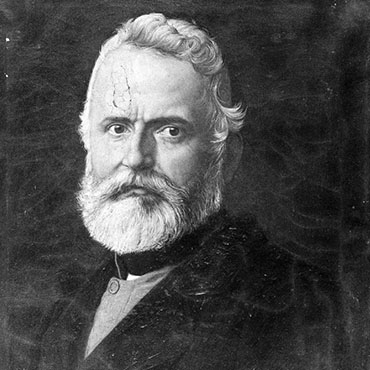Cavalletto was born in Padua in 1813 to a working-class family. Having lost his father when he was young, Cavalletto was brought by his grandfather who encouraged him to study, and this led to a degree in civil engineering. Having started his career in public works, he was involved in the restoration of the city gates and in a variety of issues relating to water. But in 1848, when he had reached a level that required him to swear allegiance to the State, he refused and, under the influence of the anti-Austrian sentiments in his family and of his familiarity with the liberal circles in Padua, joined the volunteer corps.
Following the unfortunate outcome of the war, the voluntary army was disbanded and Cavalletto, who had played a major role both in the army and on the political and diplomatic front, returned to Padua and undertook freelance work, in order to avoid any participation in the imperial public service. He became involved in clandestine patriotic activities and in Mazzini propaganda, resulting in his arrest. He was condemned to death, but the sentence was commuted to 16 years in prison by General Radetzky, whereas many of his comrades, known as the Belfiore martyrs, such as Bernardo Canal, Angelo Scarsellini and Tito Speri, lost their lives. He lived as a prisoner and in a poor state of health from 1853 to 1856, firstly in the Josephstadt Fortress and then in Ljubljana, until his sentence was suspended following an amnesty.
After a period in Padua in the employment of the Assicurazioni Generali company, he became a supporter of the Savoias and the political stance of Cavour, and he moved to Turin, where he carried on his battles for the independence of the three Venetian regions, taking up the cause of those who had to emigrate with the Veneto Central Committee.
From 1860 onwards he was elected to Parliament during several legislatures. Despite a number of disagreements that caused him to resign from the Committee, he took part in the government commission on emigration and, during the Third War of Independence, not being able to fight any longer, he was engaged in an intense activity of gathering military information, for which he was decorated after the liberation of Veneto.
Having started his career as a civil engineer, he ended it as an inspector. As an influential figure on the Right of the Parliament, he was elected several times, with responsibility for Public Works, which mainly involved the rail network and the maintenance and organisation of the waterways. As an opponent of the temporal power of the Church, he claimed Rome for Italy. After the death of Quintino Sella, he became close to Depretis and later Crispi, whose colonial policy he admired. After his election as a senator in 1892, he continued to work despite severe health problems, which led to his death in Padua in 1897.
Antonio Favaro included Alberto Cavalletto among the personalities who had been of vital help in achieving his own life’s work, and praised him (“who in everything he agreed to support he displayed a passion that drew upon his firm conviction of good and his certainty that what he was doing was for the good of the Country, which he loved more than anything else”) for the merit of having convinced the Minister of Education, Michele Coppino, to give him a personal audience and listen to “all the reasons that supported a new edition of the works of Galileo”.


